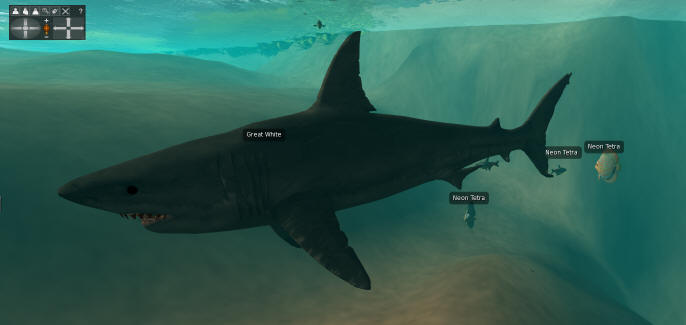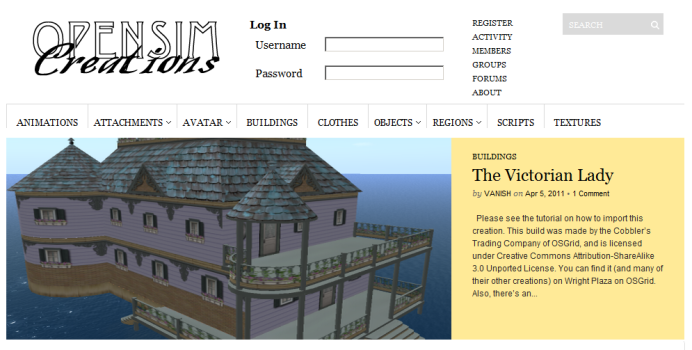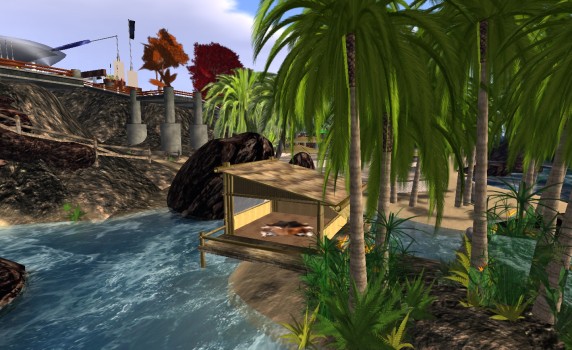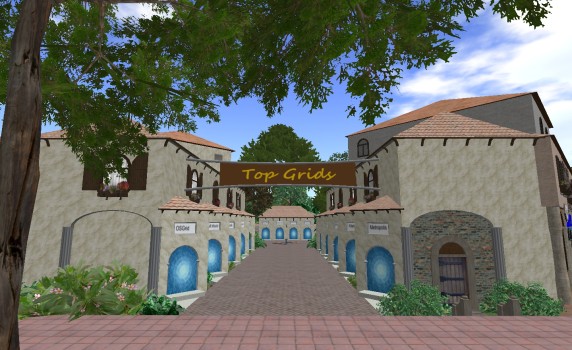One-man — and one-woman — shops are putting content in danger across the metaverse. Documentation, code, virtual content, even entire grids are at risk when it’s just one person running the project.
Radegast, METAbolt and LibOpenMetaverse
One of the key foundations of OpenSim is LibOpenMetaverse — originally LibSecondLife — which is the library of messages grids and regions send to and receive from viewers.
Volunteer developers deciphered these messages and were able to create bots. This dates back to before the viewers were open sourced.
Then this same collection of messages was used to build OpenSim. Although it’s a common misunderstanding that OpenSim was made possible by Linden Lab releasing its viewer code, OpenSim developers were actually prohibited from working on or even looking at the viewers because of incompatible license terms. Instead, they built everything from scratch, using LibOpenMetaverse to reverse-engineer virtual world that looks a lot like Second Life on the surface — but it dramatically different under the hood.
The actual LibOpenMetaverse code library is collected on github, a popular site for sharing open source software. But the documentation for it was on a separate website, openmetaverse.org — and that website has just disappeared, replaced but what seems to be a temporary filler site.
The disappearance is already causing problems for OpenSim developers.
“I’ve been playing for many years with bots using LibOpenMetaverse and was just now looking for the docs so I could update my custom bot and port it to OpenSim,” said Fred Beckhusen, also known as Ferd Frederix in-world. “I want have a bunch of my animals to follow my troll around. Cows, sheep, dragons, fairies, or nubile whatevers. It would be good for parties, as I could fill a dance floor anywhere with cows.”
Beckhusen runs the Outworldz site, which is an amazing and huge collection of scripts, tutorials, meshes, textures, tools, and other content for Second Life and OpenSim. He is particularly well-known for his animated animals.

“Now lib.openmetaverse.org appears to be gone entirely,” he told Hypergrid Business. “I’ll try and reconstruct what I can from the Wayback machine, but copyright issues may make this difficult.”
Beckhusen said he’s also worried about the Radegast and METAbolt viewer projects.
“Latif Khalifa, the author of Radegast and maintainer of LibOpenMetaverse, is quite ill,” he said. “Latif has been a wonderful and important developer for many years, and has made many useful tools. His site Primsearch for megaprims, no longer answers.  Another key piece Latif made for Second Life and OpenSim infrastructure is the Grid URL Persister, which is very useful for HTTP-In scripts. And like any paid-for web site, even on Google App Engine, I fear it may go down some day.”
Another one-man project is the text-only METAbolt viewer, originally created by Legolas Luke.
“I have used METAbolt for years,” said Beckhusen. “The source and docs are there — for now — but the author has refused to allow it to be further developed under that name.”
CasperTech, the company that took over METAbolt development last year, recently announced that they will no longer be working on the METAbolt project, but will be developing a new viewer based on Radegast, instead.
Linda Kellie and OpenSim Creations
The OpenSim community has also seen two major content sites vanish recently.
Linda Kellie had a site where she posted all her content — and giant and incredibly useful collection of a very broad variety of content, all licensed CC0 for any use whatsoever on any grid.

Fortunately, when she left virtual worlds and took the site down, Zetamex stepped in and provided hosting for the entire repository at Zadaroo.com. Her OAR region files — as well as many others — are also available on the Outworldz site.
OpenSim Creations wasn’t as lucky. When the site went down last fall, most of the content was lost.

One-man grids
The most … notorious … example of what can happen when a single person is in charge of a grid is the story of AviWorlds.
The grid is so closely associated with its founder, Alexsandro Pomposelli, that anything that personally affects him has the possibility of shutting down the entire grid. If he’s stressed and overworked, the grid goes down. If he has a dispute with a partner or hosting company, the grid goes down.

Most other grids of any significant size are able to put a management team together, so that they are not dependent on what happens to any single person.
AviWorlds is a case study of what happens otherwise.
Survival tips
If you are an individual in control of a large amount of content — especially content that’s partly or fully created by the broader community — then you should start thinking of ways to protect that content in case something happens to you.

I, myself, am guilty of forgetting to do this. Both Hyperica and Hypergrid Business are vulnerable in case something happens to me. And while I am the author of many of the articles on this site, more than 140 other writers and hundreds of companies have contributed content as well.
Some tips:
- Succession planning — Have at least one other person ready to step in and take over if anything happens to you. This is also handy if, say, you ever want to take a vacation.
- Pay ahead — If you can, pay a year or two ahead for hosting and domain registration, so that if there’s a temporary emergency, everything will at least continue to stay up.
- Make and test backups — If you don’t have an automated mechanism to create backups of everything, do it now. If you have a system, go and check to make sure it’s working, and set up a schedule so that the backups get checked on a regular basis.
- Have an exit strategy — What happens if you just decide to leave? Will you donate your content to the community? Sell it? Hand it over to your successor?
- Create an emergency kit — If you’re hit by a bus, where are all the logins and passwords? Where are the backups kept? If you expect a family member to step in and help, make sure that they know what to do with your virtual world stuff. For example, you might have a file with instructions and passwords that they could send to your successor if something happens to you if the successor doesn’t already have all this information.
- Include copyrights in your will — If your kids are anything like my own, they aren’t going to care a bit about your virtual world stuff. If you have a will, leave the content to someone who will care about it, or donate it to a community group. If you leave some money that can be used for temporary hosting or migration, that would be nice, as well.
- OSCC 2024 Submission Deadline Approaching - October 19, 2024
- AvatarLife Viewer adds video calls, screen sharing - October 19, 2024
- Spooky season brings more visitors to OpenSim worlds - October 15, 2024
